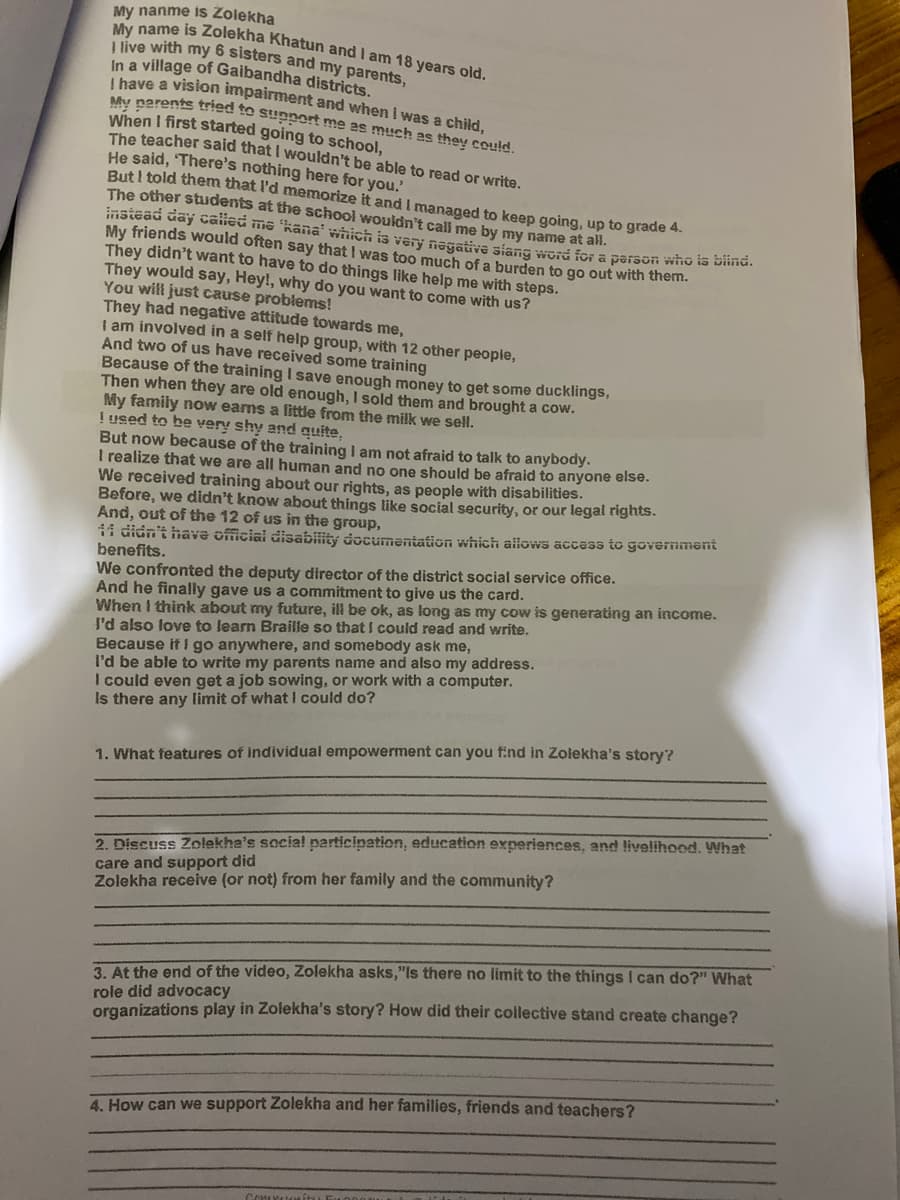5.How can we advocate for inclusive change in the way that organizations work?
Management, Loose-Leaf Version
13th Edition
ISBN:9781305969308
Author:Richard L. Daft
Publisher:Richard L. Daft
Chapter6: Managing Start-Ups And New Ventures
Section: Chapter Questions
Problem 3CFCA
Related questions
Question
5.How can we advocate for inclusive change in the way that organizations work?

Transcribed Image Text:My nanme is Zolekha
My name is Zolekha Khatun and I am 18 years old.
live with my 6 sisters and my parents,
In a village of Gaibandha districts.
I have a vision impairment and when I was a child.
My narents tried to support me as much as they could.
When I first started going to school,
The teacher said that I wouldn't be able to read or write.
He said, 'There's nothing here for you.
But ! told them that l'd memorize it and I managed to keep going, up to grade 4.
The other students at the school wouldn't cali me by my name at all.
insiead day calied me 'kana' which is vary negative siang word for a person who is oiia.
My friends would often say that I was too much of a burden to go out with them.
They didn't want to have to do things like help me with steps.
They would say, Hey!, why do you want to come with us?
You will just cause problems!
They had negative attitude towards me,
I am involved in a self help group, with 12 other people,
And two of us have received some training
Because of the training I save enough money to get some ducklings,
Then when they are old enough, I sold them and brought a cow.
My family now earns a little from the milk we sell.
! used to be very shy and quite,
But now because of the training I am not afraid to talk to anybody.
I realize that we are all human and no one should be afraid to anyone else.
We received training about our rights, as people with disabilities.
Before, we didn't know about things like social security, or our legal rights.
And, out of the 12 of us in the group,
1i didn't have official disability documeniation which aiiows access to govermmant
benefits.
We confronted the deputy director of the district social service office.
And he finally gave us a commitment to give us the card.
When I think about my future, ill be ok, as long as my cow is generating an income.
I'd also love to learn Braille so that i could read and write.
Because if I go anywhere, and somebody ask me,
l'd be able to write my parents name and also my address.
I could even get a job sowing, or work with a computer.
Is there any limit of what I could do?
1. What features of individual empowerment can you find in Zolekha's story?
2. Discuss Zolekha's social participation, education experiences, and livelihood. What
care and support did
Zolekha receive (or not) from her family and the community?
3. At the end of the video, Zolekha asks,"ls there no limit to the things I can do?" What
role did advocacy
organizations play in Zolekha's story? How did their collective stand create change?
4. How can we support Zolekha and her families, friends and teachers?
Expert Solution
This question has been solved!
Explore an expertly crafted, step-by-step solution for a thorough understanding of key concepts.
This is a popular solution!
Trending now
This is a popular solution!
Step by step
Solved in 2 steps

Recommended textbooks for you

Management, Loose-Leaf Version
Management
ISBN:
9781305969308
Author:
Richard L. Daft
Publisher:
South-Western College Pub

Understanding Management (MindTap Course List)
Management
ISBN:
9781305502215
Author:
Richard L. Daft, Dorothy Marcic
Publisher:
Cengage Learning

Management, Loose-Leaf Version
Management
ISBN:
9781305969308
Author:
Richard L. Daft
Publisher:
South-Western College Pub

Understanding Management (MindTap Course List)
Management
ISBN:
9781305502215
Author:
Richard L. Daft, Dorothy Marcic
Publisher:
Cengage Learning